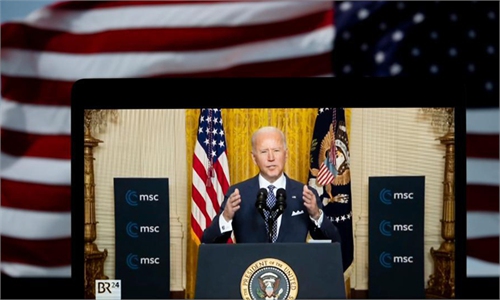
Illustration: Liu Rui/GT
US President Joe Biden will hold a virtual bilateral meeting with Canadian Prime Minister Justin Trudeau on Tuesday. As this will mark Biden's first (online) official meeting with a foreign leader since taking office, the event has attracted significant attention and interest from all sides.During Biden's first month in office, he signed a slew of executive orders covering a long list of domestic issues, with little extended to US' foreign affairs. With the Biden administration's foreign policy tones remaining vague or kept implicit, the president's upcoming meeting with Trudeau may serve as an important window for observers to seek more clues for understanding of his administration's policy preferences toward its foreign relations, or whether Biden is to proceed with multilateralism and globalization.
According to a statement the Canadian Prime Minister's Office issued on Saturday, economic and trade-related topics will be one of the highlights of the meeting between the two leaders, which will cover issues including economic recovery from the pandemic, maintaining supply chains, global climate change, and their bilateral energy relationship. This is understandable considering that the US and Canada have always enjoyed close economic and trade ties due to their close proximity.
But the US-Canada economic and trade relationship suffered during the previous Trump administration. The former US president forced renegotiations of the North American Free Trade Agreement (NAFTA) and once imposed punitive tariffs on Canada's aluminum and steel exports.
While Biden has said he will restore stability and normality to ties with some of the US' traditional allies like Canada, one of the US president's Day 1 orders is to kill the Keystone XL oil pipeline carrying crude oil from Canada to Nebraska, and that policy reversal has dealt a heavy blow to the prospects of US-Canada energy trade.
The decision is totally justified given Biden's firm pursuit of curbing climate change by reining in carbon emissions. However, the move does not bode well for Ottawa, which is disturbing enough to raise concerns over the future of their economic ties.
And, the Keystone XL project is not the only issue that has thrown the US-Canada economic and trade relationship into uncertainty. Last month, Biden signed the "Buy American" order aimed at bolstering US federal government purchases of American-produced goods, in an effort to support domestic jobs amid the pandemic. Given the close ties between the two countries, it is almost certain that Canada's national interests will be hurt by the order.
The US is Canada's largest trading partner, accounting for more than two-thirds of all Canadian trade. Trudeau said that Canada will seek exemptions from the Buy American Act, according to a recent Reuters report.
Under such circumstances, what kind of signal the Tuesday meeting will be sent out is of great interest to the world. Will the Biden administration strengthen its energy and supply chain cooperation with Canada in other ways to appease its northern ally, or continue to give priority to its domestic economic recovery?
Either way, it remains to be seen how the Biden administration will balance boosting domestic manufacturing with promoting regional industrial chains, and the US attitude toward regional industrial chains may offer the world some clues about the future of its foreign policy trends.



